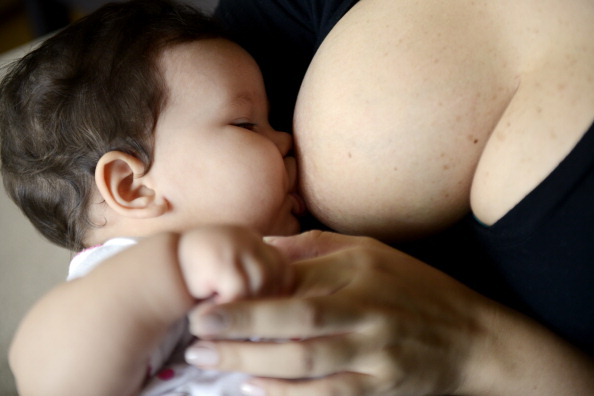TORONTO — Like many new moms, Elisa Albert struggled with breastfeeding her baby.

“It’s like two virgins. It’s not going to be good. Nobody knows what they’re doing,” she said.
And it would be a slow and hard process to figure it out. Albert’s milk supply began dwindling because her then-newborn, now 6, wasn’t latching on to her breast properly. That meant he was nursing all the time, but not really filling up.
“It was hell.”
By the time her baby was 10 days old, he had lost a pound, sending the new mom into panic mode. Neither the doula nor the three lactation consultants she had seen could help her. Each seemed to offer conflicting advice.
Albert — who wrote the recently-released book After Birth based on her experience — came to see the breast pump as a “torture device.” Still, she pumped between frequent feedings as she was told, which was not only painful but yielded little results.
She then finally took up the offer of a friend, who offered to nurse her newborn.
“It felt like we were going rogue. Everything that’s out there for us is failing us. And we’re going to use our common sense and do this in a way that’s actually helpful,” she said of the decision.
In Africa, where the friend’s mother was a midwife, it’s reportedly common practice to give a child struggling with feeding to a mother who has mastered the skill. In turn, the newer mom breastfeeds the more “experienced” baby. Through this, the mothers are able to figure out what the problem is.
“It just seemed like ‘why are we trying to re-invent the wheel?'”
- Posters promoting ‘Steal From Loblaws Day’ are circulating. How did we get here?
- Canadian food banks are on the brink: ‘This is not a sustainable situation’
- Video shows Ontario police sharing Trudeau’s location with protester, investigation launched
- Solar eclipse eye damage: More than 160 cases reported in Ontario, Quebec
Albert felt an incredible sense of relief to see her son finally get a proper feeding from her friend; it filled her with hope.
Lactation expert Dr. Jack Newman, who helps run the not-for-profit International Breastfeeding Centre in Toronto, said he has recommended this option in the past. In fact, he admitted his wife breastfed her sister’s baby a couple times.
“This is probably done a lot more than is recognized.”
Movie trailer: Milk
Wet nurses (lactating women who breastfeed other people’s children) were common for centuries until formula was introduced. Now, it’s not very common to see. Although in the U.S., you can order one online.
That’s where many people turn for their breast milk needs nowadays. Some mothers are so desperate they’re willing to buy it there. That, Newman said, can be hazardous.
“When commercial considerations come into play, so does corruption. For example, it is quite possible that what the receiver gets is not pure breastmilk, but diluted with formula or cow’s milk.
READ MORE: Breast milk sold online watered down with cow’s milk, study warns
“However, if the mother gets the milk through a website like Human Milk 4 Human Babies and follows the recommendations, I think one can say that the milk is safe and better for the baby than formula.”
Human Milk 4 Human Babies describes itself as a network committed to “fostering community between local families who have chosen to share breastmilk.” There are various local branches on Facebook, where mothers offer up their breast milk and others post about their needs.
You can find similar posts on sites like Kijiji.
Albert was lucky enough to have a friend with a freezer full of breast milk, which she generously parted with. That held Albert over until she found a fourth lactation expert, who enabled her to successfully start breastfeeding on her own. She kept doing it until her son was three.
Canada’s health guidelines recommend a baby be fed strictly breast milk for the first six months. Not everyone is as persistent as Albert, however. The most-recent data from Statistics Canada states 26 per cent of those who stopped before six months did it because of insufficient milk.
There are lactation consultants who can help with that. Some will prescribe pills to help increase a mother’s milk production or even get them to start lactating again once their original supply has dried up.
The Public Health Agency of Canada lists La Leche League, midwives, local support groups and public health clinics as possible supports for women struggling with breastfeeding.
There are also several human milk banks across Canada, including one in B.C., Alberta, Ontario and Quebec. Unfortunately, there is not enough to meet the need, according to Newman, and priority is given to premature babies.
His advice is to try and stop the problem before it starts. He says to try and have as natural a birth as possible.
“The more a mother’s labour is intervened with, the more complications there are with breastfeeding,” he explained.
“If you have problems, get good hands-on help as soon as possible. The sooner you get help, the better.”
Newman was featured in the documentary, Milk, which premiered at Toronto’s Hot Docs festival this week. There’s another screening of the film on Wednesday.



Comments